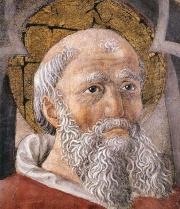St Ambrose

Bishop of Milan. Ambrose was born at Trier in 339. He was the son of the Pretorian Prefect of Gaul. He studied Greek rhetoric and poetry and became a successful advocate.
In 370, he became governor of Aemilia and Liguria at Milan. When the first Arian bishop died, he appealed for peace at the noisy assembly called to elect his successor.
During his speech a child cried out: "Ambrose for bishop". He was very surprised as he was not even a Christian. But a huge crowd began to call for him as bishop and within a week he was baptised and consecrated bishop.
He studied scripture and the writings of Origen and Basil. In time he was to become a very influential figure in the early church. He promoted monasticism and the cult of Our Lady. He became friends with St Augustine's mother, St Monica and, through her, got to know her son, St Augustine, and had an important role in his conversion.
St Ambrose's daily routine as bishop of Milan combined hard work with accessibility to all. As the city was the administrative capital of the Western Empire he came to play an important role in politics, guiding and sometimes criticising rulers. He stood up to Theodosius after an infamous massacre of men, women and children at Thessalonica.
He fought against the Arian heresies and refused to give up a church for Arian worship. He also managed to stop the revival of a cult to the goddess Victory.
His principle works are on the Sacraments, a book on the Office of Clerical Ministers, a commentary on St Luke's Gospel and one catachetical instruction. He also wrote many hymns and taught his people to sing.
St Ambrose died at the age of 58 in the year 397 and was buried under the high altar of his basilica.
In art he is often represented as in episcopal vestments with a scourge symbolising the penance he imposed on the Emperor, or else with a beehive because a swarm of bees, symbolising his future eloquence, settled on him when he was a child.












